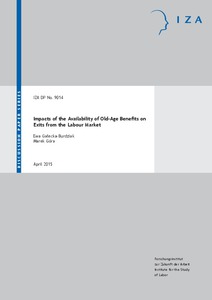Impacts of the availability of old-age benefits on exits from the labour market

Galecka-Burdziak, Ewa ; Gora, Marek
Institute of Labor Economics, Bonn
IZA - Bonn
2015
22 p.
labour force participation ; old age benefit ; older worker ; unemployment
Discussion Paper
9014
Older people
English
Bibliogr.
"Given human longevity, fertility, health and social developments, workers become inactive relatively early throughout Europe. This partially stems from older workers being pushed out of the labour market and from personal motivation to prefer benefits to wages. We focus on this latter effect and analyse whether workers would have stayed active had they not been tempted by the availability of the old-age benefits. We focus on Poland, a country severely experiencing the problem of population ageing. In 2013 persons 50+ accounted for 37% of the total population. Although they enjoy a relatively low unemployment rate, their participation and employment rates are very low: 34% and 32%, respectively. We analyse whether this is due to the discouraged worker effect. We identify the cyclical properties of activity and discouraged worker rates, and estimate a set of logistic regressions to identify the determinants of the exits from the labour market. Cyclical analysis indicates that the added worker effect prevails over the discouraged worker effect. The discouraged worker effect appears with a delay of a few quarters. The process is asymmetric for females. Workers often permanently leave the market. The availability of old-age benefits increases the probability of outflow from unemployment to inactivity, as do unemployment rate changes. If old-age benefits become the main source of income for the worker within the 1 year interval, they are 8 to 20 times more likely to leave the workforce compared to those who receive either unemployment benefits or social welfare benefits."
Digital
The ETUI is co-funded by the European Union. Views and opinions expressed are however those of the author(s) only and do not necessarily reflect those of the European Union or the ETUI.